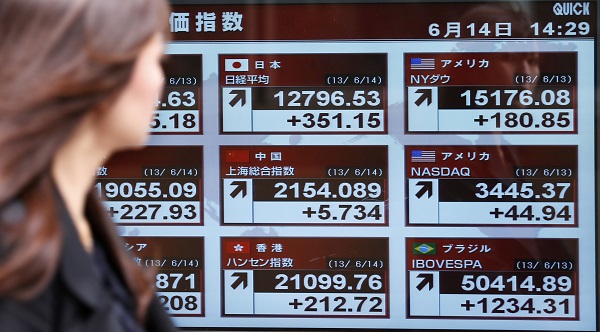World stocks mixed as Asia rebounds

A woman looks at an electronic stock board of a securities firm in Yokohama, near Tokyo, Friday, June 14, 2013. Japan’s Nikkei 225 index recovered some of its losses Friday as Asian stocks rebounded from Tokyo’s sharp decline on Thursday after investors were encouraged by positive U.S. economic news. AP Photo
AMSTERDAM—Global stocks were mixed Friday as Asia rebounded from a sharp selloff, with U.S. markets losing early gains after unimpressive economic data and a warning from the International Monetary Fund on growth.
The price of oil briefly rose above $98 per barrel — its highest level since September — due to geopolitical tensions in the Mideast after US President Barack Obama said he would arm Syrian rebels.
Brenda Kelly, Senior Market Strategist at IG Markets said she sees “signs of exhaustion” in the overall downward trend for the world’s stocks, which has been driven by fears the U.S. Federal Reserve might wind down its bond-buying program and that the Bank of Japan has done all it is prepared to do to stimulate the Japanese economy.
But “the suggestion from the Bank of Japan minutes overnight was that more aggressive action could occur, should the policymakers deem it necessary,” she said, and “it is extremely unlikely that Federal Reserve President Ben Bernanke will hurry to completely remove the liquidity punchbowl.”
Still, observers agreed markets are likely to remain anxious until the Fed meets next Wednesday.
In Europe, Britain’s FSTE 100 rose almost 0.1 percent to close at 6,308.26. France’s CAC-40 also gained 0.2 percent to 3,805.16, while Germany’s DAX rose 0.4 percent to 8,127.96.
U.S. markets initially extended the strong gains they made Thursday before turning south.
At mid-session, the Dow Jones Industrial Index was down 0.5 percent to 15,105.30, and the S&P 500 was off 0.4 percent to 1,629.41.
“There are signs that the U.S. recovery is gaining ground and becoming more durable,” Christine Lagarde, the IMF’s managing director, said in a written statement.
The fund forecast U.S. economic growth of 1.9 percent this year, but warned that attempts to reduce the budget deficit too quickly could kill the recovery.
The latest economic indicators were mixed. The University of Michigan index of consumer sentiment fell to 82.7, slightly worse than expected, but Federal Reserve data showed U.S. factory output increased 0.1 percent in May after declining 0.4 percent in April. Overall industrial production was flat.
In Asia, Tokyo’s Nikkei 225, the regional heavyweight, gained 1.9 percent to close at 12,686.52, recovering some of its losses after a 6.4 percent plunge on Thursday.
Japanese markets have weakened following a burst of euphoria over Prime Minister Shinzo Abe’s economic turnaround plan. Markets had surged 50 percent since the start of the year but doubts are mounting about whether Abe’s plan will work.
The Nikkei’s plunge Thursday took the Japanese market to a 20 percent decline from its May 22 high — the definition of a bear market.
China’s benchmark Shanghai Composite Index gained 0.6 percent to 2,162.04, coming off its lowest close in six months following Thursday’s 2.8 percent slide. Hong Kong’s Hang Seng gained 0.4 percent to 20,969.14 and Seoul added 0.4 percent to 1,889.24. India’s Sensex rose 1.6 percent to 19,126.03.
Stephen Lewis, Chief Economist at Monument Securities said markets will remain anxious until the Federal Reserve meeting next Wednesday. Fed Chairman Ben Bernanke is expected to give more information about whether the Fed intends to “taper” or slow, its asset purchase program.
“The fear that Mr Bernanke and his colleagues will not taper… indeed dare not taper, may be as significant an element in the current market malaise as anxiety that they will,” he said in a note.
He said if the Fed doesn’t slow purchases, people will be worried the market’s rise in the first part of the year isn’t sustainable. But if it does slow purchases, the market is likely to continue its more recent slide.
“Either way, carefree days would be over,” he said. “The market has realized it is difficult to write a happy ending to this story.”
In currency markets, the euro declined to $1.3315 from $1.3345 late Thursday in New York. The dollar was down sharply against the yen, 1.2 percent weaker at 94.24 yen.
Benchmark oil for July delivery rose strongly, up 99 cents to $97.95, gaining on tension in the Mideast after U.S. President Barack Obama’s decision to arm Syrian rebels.